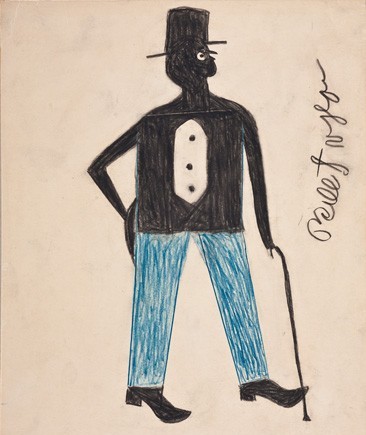Quasi-unintelligibility (Part 2)

I mentioned in my previous post that I would consider more closely Wallace Stevens’s “Man Carrying Thing” in my next post, and that means now. You can read the poem here. Let me tell you what I like about it.
(1) I like the poem’s first sentence and how it’s lineated: “The poem must resist the intelligence / Almost successfully.” Stevens himself must have liked this sentence, too—enough to repeat it at least once. (It also appears in his Adagia.) The sentence’s lineation serves to present the idea that “The poem must resist the intelligence” categorically at first, as in “completely and in all cases,” but then, after the linebreak, we’re given the qualification that it must do so “almost successfully,” which is to say, “never quite at all.” If the first line’s severity of statement makes my mind seize up a little, what happens after the linebreak brings it a little ease. I find this gratifying in a more or less impersonal, abstract way. Which is to say that at this point it isn’t so much the content of the statement itself and what it means to me that I respond to but the way I feel my mind tense up and then relax.
(2) I like the second half of line 2, too: “Illustration” with a colon after it. I think that’s pretty sweet. What might, from across the room, look like a perfectly decorous lyric poem keeps acting instead like the bossy little essay we never saw coming. I like that. Sure, you see this kind of thing done often enough today, maybe even more often than you care to, and Stevens himself has done it elsewhere before—and even more interestingly, in fact. Think of the opening of his “Connoisseur of Chaos” (1938). But I bet this manoeuvre was still pretty remarkable back in the spring of 1946 when “Man Carrying Thing” first appeared in Yale Review. I also like how the word “Illustration” brings the syllable count of the poem’s second line up to a good clean ten, just like the first. The poem’s lines range throughout from ten to thirteen syllables in length, so it’s relatively regular—and I like that, too, for what it’s worth.
(3) I should have mentioned at the start that I like the poem’s title—“Man Carrying Thing.” Just as there’s some kind of brain pleasure to be had in watching a poem behave like an essay, there’s also some fun in seeing it assume a title that might be thought more appropriate for a drawing. Not roller-coaster fun, but fun. The word “illustration” refreshes that feeling. I think here, for example, of the stark titles given to the work of the amazing outsider artist Bill Traylor, who was born a slave in 1854, and after a lifetime of living hand-to-mouth, began painting and drawing at the age of 87. Also in the spring of 1946, or rather on the first or second day of summer, a well-intended but at times excruciating profile of his life and work, Allen Rankin’s “He Lost 10,000 Years,” appeared in Collier’s magazine. You can read it here (later).

(4) At this point some of us might be experiencing a kind of familiar, non-threatening, cultivated confusion—“What am I reading here,” we might ask ourselves, “a poem, an essay, or a drawing?” To experience this confusion and the special pleasure that comes along with it, provided you can inhabit it comfortably, you may need to have a set of expectations regarding how poems ordinarily do and don’t go about their business, especially when they look all suit-and-tie like “Man Carrying Thing.” In this sense the pleasure in question isn’t as accessible as that of a roller-coaster, say, but on the other hand, it’s even more accessible, because it takes place right here inside your mind. And I think there’s a pleasure—or more likely, a relief—that comes with being confused and uncertain but at the same time feeling oddly on top of it, safe. The mind is often faced with confusions and uncertainties, as you have by now no doubt come to notice, and I think when it can learn to inhabit them more comfortably through practice it will be a happier mind, a mind kinder to itself and others, and more patient.
(5) I like the phrase “a brune figure” quite a bit—enough to mention it, at least. And yet it gives me pause. It seems very Stevensian to me, probably because it’s sophisticated but at the same time kind of funny, at least on first blush. Again, not a knee-slapper, but playful. Playful and even a little goofy. “Brune” is just a French way of saying brown, and Stevens feminizes it because the word for figure in French (la figure) is feminine. That the figure in the poem is identified as a man in the title but is then modified by a feminine adjective provides us with yet another fine confusion. And get a load of this: brune in its nominal form, “la brune,” means “dusk,” that neither/nor between day and night, which happens also to be the time of day when the poem is said to take place (“a winter evening”). This last bit of information was brought to my attention by Eleanor Cook in her A Reader’s Guide to Wallace Stevens, which is useful on such occasions. The brownness of the figure is left undifferentiated from all possible brownnesses—is it his coat, his hair, or else his skin that’s brown? Are we trapped in a sepia drawing? Or is it just so dim where we are that everything seems to be a shade of blue or black or brown or gray? Am I less comfortable with this confusion, this lack of clarity? I’ll have to get back to this later, if I can.

(6) In my life, which is where I am right now, I’ll either barely pay any attention or else I’ll pay way too much. Either I’m completely lost in something in particular or else I’m bound in an inner winter fog. I don’t think I’m all that special in this regard. I know a lot of people who are like this and we’re all moving along in the same vague way. It’s relatively luxurious, as far as problems go. Let me be the first to say so. But it’s been dawning on me lately that what I had hoped would be a short list of the things I like best about the poem “Man Carrying Thing” is now fast approaching 1000 words in length and I’m still no deeper into it than the third line. So I’m going to have to start speeding things up already. Odd thing is, while I like “Man Carrying Thing” well enough overall, it’s not in my top 10 Stevens poems, and probably not my top 40. I’ll have more on that later, I think, or else I shouldn’t have brought it up at all.
(7) I like the words “winter,” “floating,” and “snow.” There are words I like for the way they sound, words I like for how they look, and words I like for what they mean. These three words belong to the third category, but they do so so strongly that even the sound of them starts to appeal to me—the very mention of their names, etc. Admittedly the second category (words I like for how they look) seems fairly silly to me, but it still exists. It either emphatically does or does not include the word “goggles,” which is either perfect or way too much, depending on where I am in my life. A better example might be “rivulet,” which looks so dignified to me right now it made my eyes well up a bit to type it. I’m not kidding. Even “kidding” looks pretty appealing to me right now, for that matter. Come to think of it, “rivulet” belongs to all three categories. But I don’t know in my life if I ever saw a rivulet and thought to call it that. Make of that what you will. In any case, why it should be that to like a word for its appearance seems silly to me compared to liking it for how it sounds is of no pressing interest to me now. Somebody somewhere reading this might have a thought about that, and I know how it will go—the primacy of the spoken word, what an undeconstructed tool, where have you been all your life? My answer: right here. And there are probably 200 words that I’ll always be happy to encounter in a poem, no matter what or when or where, and “winter,” “floating,” and “snow” are among them. So is “apple.” So is “air.”

(8) In the interests of space and of time, let me finish today’s post by admitting that I don’t particularly care for the third and fourth stanzas of “Man Carrying Thing,” where “to care for” means to take immediate pleasure in. Of course they articulate intelligent things and I hope to discuss these in a future post, but I tend to vague out when reading them—even now, when it couldn’t matter more. They make me feel like my brain has been holding its breath too long, and not because it’s just inhaled something special. That said, Stevens really brings it back home in the last three couplets, especially in the fifth, which is where he throws in the snow and dives right into the human struggle, and I always love it when he does that. Always. A big reason why I read Stevens’s poetry as much as I do is because of the way it presents the difficulty and the joy, the great challenge and even greater privilege, of being a thinking, feeling animal, and one that has the capacity to reflect back on itself, for better or for worse—which is to say, even though it amounts to, often, “a horror of thoughts.” In my next post I’ll try to say what I mean by what I haven’t said yet but only alluded to.
Timothy Donnelly is the author of the poetry collections Twenty-seven Props for a Production of Eine...
Read Full Biography

